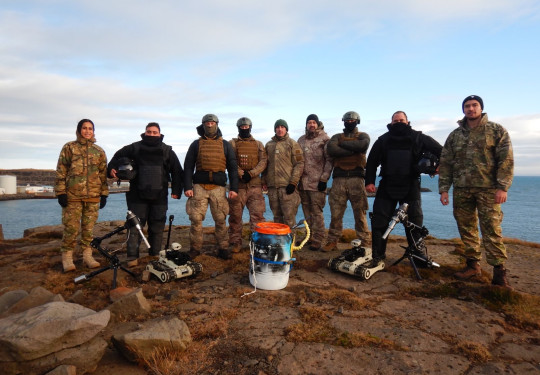Defeating the Device
You can’t deploy much further than Iceland. Navy Today catches up with the divers at Exercise Northern Challenge.
18 December, 2021
It’s a first for the Royal New Zealand Navy – having a team at NATO’s premier Improvised Explosive Device Disposal (IEDD) exercise held in Iceland over a three-week period.
The annual Exercise Northern Challenge, hosted at the Icelandic Coast Guard facility in Keflavik, involves around 17 countries coming together to practise responding to real-life terrorist incidents involving improvised and military explosive devices.
Petty Officer Diver Luke Leadbetter, HMNZS Matataua, says the Navy have been sending one or two people each year in a directing staff role, but this time nine personnel, including a medic, logistics supply specialist and five operators, were able to attend as part of a Maritime Explosive Ordnance Disposal (MEOD) Team.
Matataua’s Clearance Divers are the only trade in the New Zealand Defence Force that conducts maritime ordnance disposal.
“Those years we’ve been sending people as directing staff, that’s allowed us to get a foot in the door. It’s about half a decade of groundwork to get to this point.”
The focus of the exercise is on the operator, aiming to sharpen their technical skills to effectively neutralise devices in scenarios that become increasingly complex and reflect realworld situations or challenges.
“The team leader will get the tasking, and the MEOD team will go out to the Area of Operation, do the work, while directing staff are there, assessing. Each evening, all the directing staff will go off, and critique what they saw. It’s about constant evaluation and improvement.” For this exercise PODR Leadbetter was deployed as one of the directing staff.
In other Explosive Ordnance Disposal (EOD) exercises there are other elements at play, including networking with other non-EOD units and practising communication and integration. “But this is purely about the operator. This is real stuff. You’ve got IED’s with technical switches, wi-fi armed, radio activated, all sorts of things. Every device they have to defeat, is a device that has been used in anger somewhere in the world. It’s happened before. Our job is to solve the puzzle. If you have to do this for real, there’s no space for making mistakes. But we have very good processes, extremely well-thought-out Standard Operating Procedures.”
Some tasks would involve land-based devices, but most were in the water. Actors were used as ‘witnesses’, people who had seen a device and were reporting it to authorities, and the Matataua MEOD operators would have to question them to try and get an idea of what they faced.
Able Diver Jamie Bell says the highthreat environment was a big learning curve, with other nations having more experience than New Zealand. “We got on with it. A lot of the NATO guys were happy to share their tips and tricks, which was quite cool. We’ll take this back to New Zealand. It was great to be part of the first team from New Zealand to go.”
PODR Leadbetter says New Zealand did well at Northern Challenge. “When the assessors sit down at night, going over what went well and what didn’t, you get a gauge of where we stand in the world. New Zealand was getting really good feedback, and we can be really proud of where we stand. We know we could be a real asset for our allies. We’ve proven we can do this, and definitely left Iceland with our heads held high.”
